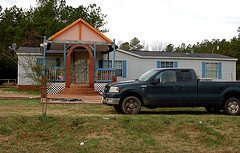The trailer is the vilified and estranged cousin of the housing world. It's all but banned in many communities, for its perceived ugliness as well as perceptions of its tenants. Its ugliness stems from its plainness—though the manufactured home industry likes to show off all the variety and souped up style it has brought forth, the plain rectangular, flat-roofed trailer remains what's truly affordable for many rural Americans.
It should also be said that a lot of trailer dwellers are very attached to their modest homes. Trailers don't look like much on the outside, but people personalize their insides just like any other house type. When it's time to upgrade or the old trailer has shown its age, trailer owners don't necessarily have the financial means to go for a ranch house or even a bungalow. Instead, they're thinking about a move from a single-wide to a double-wide. Or maybe just another single-wide with a better layout that allows family members to have just a little more privacy.
Some people who spend their whole childhoods in a trailer have an attachment to living in one that can best be explained this way:
It isn't luxury, but it's absolutely home. Compare that to the experience of many people who grew up in McMansions, or even expansive old farmhouses or two-story gems in town on Elm or Maple Street. A lot of us have little or no attachment to the houses we grew up in, despite their supposed grace and beauty.
Out here in the country, the trailer is almost as common as stick-built homes. (And heck, most houses that appear to be stick-built are actually factory-built.) But there are still lots of counties that restrict where manufactured homes can be located. It got to the point a while back that the state of Virginia had to put something in its code to make sure trailers were allowed at least in areas zoned for agriculture. No doubt other states had to do the same.
Like 'em or not, trailers have an assured place in the American housing landscape. They're affordable, all right, and despite many flaws, they are home sweet home.
[Editor's Note: The world of manufactured housing is rapidly changing thanks to the efforts of organizations like ROC USA, NextStep, CFED, and the Manufactured Homeowners Association of America. More on this in an upcoming issue of Shelterforce.]
(Photo of single-wide with portico by Flickr user taberandrew, CC-BY.)





Comments